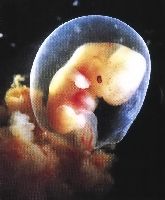British regulator gives the green light to screening of human embryos

The Human Fertilization and Embryology Authority decided that embryos could be screened before implantation for genetic characteristics that make people highly likely to develop certain breast and ovarian cancers and a type of colon cancer in adulthood.
Potential parents would have to seek permission for screening on a case-by-case basis, the authority said.
Advocates of the proposal say the impact would be limited, but critics fear it would be another step toward eugenics.
"The decision today deals only with serious genetic conditions that we have a single gene test for," said Dame Suzi Leather, who chairs the authority.
"We would not consider mild conditions - like asthma and eczema - which can be well-managed in medical practice. We would not consider conditions like schizophrenia where a number of genes have been identified but there is no single gene that dictates the condition."
Pre-implantation screening is already permitted for a type of bowel cancer and cancer of the retina. Children or young adults who have the related genes have a 90 percent likelihood of developing cancer.
The decision involves breast and ovarian cancers caused by mutations of the BRCA1 and BRCA2 genes, and hereditary non polyposis colon cancer.
People who carry the genes have an 80 percent risk of developing the cancers, the authority said.
It noted that the conditions are treatable, and that the BRCA1 and BRCA2 genes are involved in only 5 percent of breast cancer cases.
The ethics and law committee said the three diseases are "serious genetic conditions because they cause suffering and are life-threatening," and cause significant anxiety among people who know they have inherited a susceptibility.
"The fact that the inherited cancer conditions under consideration are later onset, have a lower penetrance (risk factor) and are in some cases treatable is not incompatible with the fact that these conditions are serious genetic conditions," the ethics and law panel said.
Josephine Quintavalle, director of Comment on Reproductive Ethics, said it was "frightening indeed to what extent the goal posts have been moved" on genetic screening.
"We are now starting to screen for diseases that people are susceptible to. One wonders where this process will end," Quintavalle said.
Ruth Deech, who formerly chaired the Human Fertilization and Embryology Authority, said the step would allow for informed choices.
"Nothing is going to be forced on anybody," Deech said in a British Broadcasting Corp. radio interview.
Subscribe to Pravda.Ru Telegram channel, Facebook, RSS!


